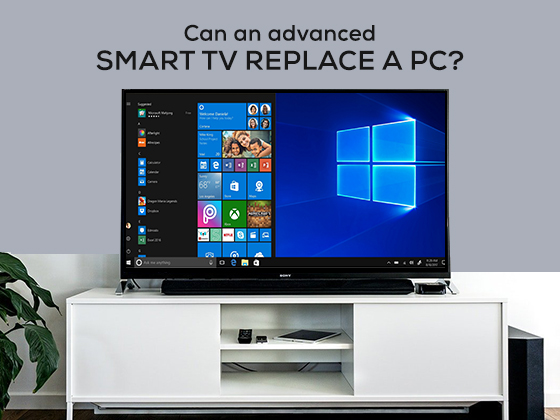The tech world is expanding rapidly in an amazingly revolutionary way. We’ve witnessed the transformation of landline phones into smartphones, desktop computers into portable laptops and watches into smart fitness trackers. And now we are noticing a new trend in the tech world in the shape of smart TVs.
Smart TVs have certainly modernized the entertainment industry in many ways. But can a smart TV replace a PC in terms of functionality? This is a question that we are addressing in this article so keep on reading.
What is Smart TV?
The main reason why smart TVs are so popular is their unique properties. Unlike traditional TVs, smart TV has an internet browser and can access the Internet using Wi-Fi. You can use a smart TV to access streaming services and can run a few built-in apps as well. Thus, it combines the features of a traditional TV and a few characteristics of a computer.
Can an advanced smart TV replace a PC?
Well, the short answer to this question is a big No! Although smart TVs can connect you to the internet, they lack various qualities of a PC. Here are some major differences that show Smart TVs have to travel a long distance to be really smart like a PC.
1) Processing Power
A smart TV features microprocessor cores that are commonly used in mobile devices, such as tablets and smartphones. Whereas we know that PCs are equipped with powerful multi-core processors that are known to run high-end devices. Smart TVs usually feature a built-in ARM CPU, while a desktop PC or laptop generally features an intel or AMD CPU.
2) Apps & Programs
The next major difference is visible when we pay attention to operating systems. A PC runs on the Windows, macOS or Chrome operating system, which is considered more powerful to run a tech device. On the other hand, smart TVs have their own operating systems, such as LG smart TVs run on webOS while Samsung’s smart TVs run on the Tizen operating system.
In addition, apps in smart TVs are usually optimized and designed for viewing and touch devices. The operating systems in smart TVs are not powerful enough to run productive programs or media editing tools.
3) User Experience
The basic purpose of a smart TV is to offer good visual experience whether you are streaming Netflix or YouTube. Some smart TVs allow users to type and chat with other people using a remote or integrated keyboard. However, communicating so is not a good experience and a very tedious activity.
On the contrary, running an app or typing words is easier on a PC. A remote is certainly not as comfy as a keyboard and/or mouse of a PC.
4) Difference in Functionality
As we mentioned earlier, smart TV is just an advanced form of traditional TV. Its major function is to entertain us providing a better visual experience and streaming videos using the internet. We can search for our favourite movies and shows, watch them, or record them to watch later.
A PC is intended to help us in creative work, such as editing videos, creating animations, and/or music editing. It improves the productivity level by solving computing problems and help us prepare diagrams and reports.
Conclusion
Both PCs and smart TVs serve different objectives and purposes. We might see smart TVs in the near future that could help us in productive tasks. But right now, smart TVs are far behind than a PC and can only help us watch our favourite shows online.

